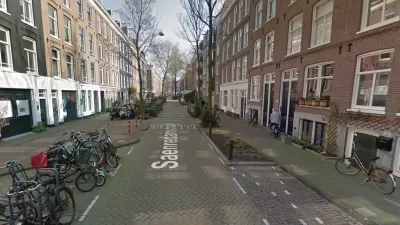UCLA Professor Donald Shoup has criss-crossed the nation lecturing about the many benefits from market pricing of parking -- but he says too many cities are still making decisions based on politics.
"..[P]lanning departments always insist that developers include a minimum number of parking spots[, but] Shoup doesn't have much respect for the ability of urban planners to determine how many spots are necessary. Since planners don't learn anything about parking in school, they learn it on the job, but because parking is so political – NIMBY neighbours constantly squawk at the thought of anyone parking on their street – what they really learn is the politics of parking.
"Planning will be looked back on as worse than phrenology, because phrenology didn't do any harm," he said, referring to the nineteenth-century pseudoscience that claimed to be able to determine character and other traits from the size and shape of a cranium.
The harm abundant free parking does feeds on itself: All that land dedicated to parking, which often sits empty for much of the day, increases sprawl, and that sprawl makes alternatives such as public transit and walking less feasible, which forces more people into cars, which increases the need for more parking."
"Although ideas seem like so much common sense, Shoup still feels they're underappreciated...Still, he knows some planners are curious because he receives more invitations to speak than he can accept. Cities pay him large lecture fees, fly him first class and then wine him and dine him, but they don't all do what he suggests because parking is so political."
FULL STORY: How the politics of parking can defile a city

Maui's Vacation Rental Debate Turns Ugly
Verbal attacks, misinformation campaigns and fistfights plague a high-stakes debate to convert thousands of vacation rentals into long-term housing.

Planetizen Federal Action Tracker
A weekly monitor of how Trump’s orders and actions are impacting planners and planning in America.

In Urban Planning, AI Prompting Could be the New Design Thinking
Creativity has long been key to great urban design. What if we see AI as our new creative partner?

King County Supportive Housing Program Offers Hope for Unhoused Residents
The county is taking a ‘Housing First’ approach that prioritizes getting people into housing, then offering wraparound supportive services.

Researchers Use AI to Get Clearer Picture of US Housing
Analysts are using artificial intelligence to supercharge their research by allowing them to comb through data faster. Though these AI tools can be error prone, they save time and housing researchers are optimistic about the future.

Making Shared Micromobility More Inclusive
Cities and shared mobility system operators can do more to include people with disabilities in planning and operations, per a new report.
Urban Design for Planners 1: Software Tools
This six-course series explores essential urban design concepts using open source software and equips planners with the tools they need to participate fully in the urban design process.
Planning for Universal Design
Learn the tools for implementing Universal Design in planning regulations.
planning NEXT
Appalachian Highlands Housing Partners
Mpact (founded as Rail~Volution)
City of Camden Redevelopment Agency
City of Astoria
City of Portland
City of Laramie





























